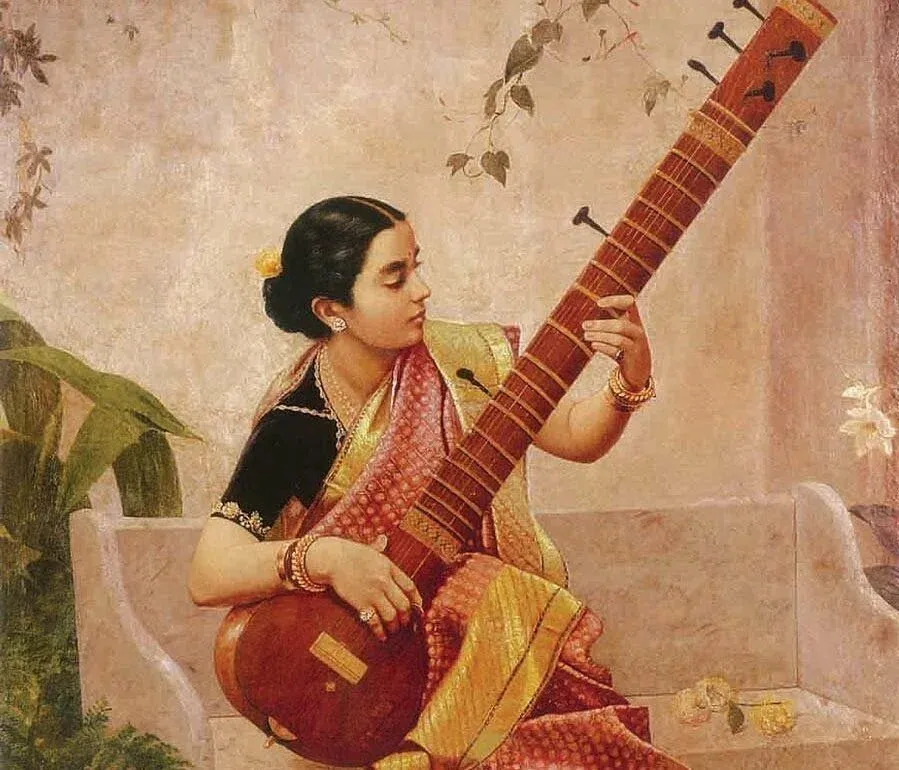Harmony of the Soul: The Transformative Power of Indian Classical Music

Music has been an integral part of human culture for millennia, transcending geographical boundaries and resonating with the deepest recesses of our souls. One such timeless tradition that has captivated listeners for centuries is Indian classical music. With its rich heritage and profound artistry, Indian classical music has earned its place as one of the world’s most revered musical genres.
A Brief Glimpse into Indian Classical Music
Indian classical music is a complex and intricate system of melodies, rhythms, and improvisations that date back to ancient times. Rooted in the Vedas, the sacred scriptures of Hinduism, this venerable musical tradition has evolved over thousands of years, shaped by the contributions of numerous maestros and musicians. It encompasses two primary branches: Hindustani classical music, which flourishes in the northern regions of India, and Carnatic classical music, predominant in the southern parts of the country.
Unlike the structured compositions commonly found in Western music, Indian classical music places a strong emphasis on improvisation. Performers engage in soulful renditions, allowing them to express their emotions and creativity while adhering to the intricate rules of the musical system known as “raga” and “tala.” Each raga (melodic framework) and tala (rhythmic cycle) invokes a distinct mood and aesthetic, making every performance a unique and emotive experience.
Purpose of this Article
In this article, we delve into the myriad benefits of immersing oneself in the enchanting world of Indian classical music. Beyond the sheer pleasure of listening, this music offers a wealth of advantages that positively impact our well-being, cognitive abilities, and cultural appreciation. As we explore these benefits, we hope to shed light on the profound effects that Indian classical music can have on the human psyche, and perhaps inspire you to embark on your own musical journey.
So, whether you are a seasoned connoisseur of Indian classical music or someone curious to explore its wonders for the first time, join us on this melodious expedition as we uncover the transformative power of this ancient musical art form. From stress reduction and enhanced focus to emotional healing and creative inspiration, Indian classical music has the potential to enrich our lives in ways that extend far beyond the boundaries of time and space.
Stress Reduction and Relaxation
In our fast-paced modern lives, stress has become an ever-present companion, affecting our physical and mental well-being. Fortunately, Indian classical music offers a respite from the chaos, providing a pathway to serenity and relaxation.
1. The Meditative Quality of Indian Classical Music
At the heart of Indian classical music lies its meditative quality. The slow and deliberate pace of performances, coupled with intricate melodies, can gently lull the mind into a state of tranquility. As the music flows through the listener’s ears, it creates a seamless bridge between the external world and the inner realm of thoughts and emotions.
2. Inducing a Sense of Calm
The melodious ragas and soothing talas have the unique ability to slow down the heart rate and lower blood pressure. Studies have shown that listening to Indian classical music can trigger the release of endorphins, the “feel-good” hormones, which contribute to a sense of well-being and relaxation.
3. Personal Anecdotes and Scientific Evidence
Many individuals have experienced the therapeutic effects of Indian classical music firsthand. Numerous testimonials speak of how regular listening sessions have helped them unwind after a long day, reduce feelings of anxiety, and promote a peaceful state of mind. In addition to anecdotal evidence, scientific studies have explored the impact of Indian classical music on stress reduction and consistently found positive outcomes.
A study published in the Journal of Advanced Research in Ayurveda, Yoga, Unani, Siddha, and Homeopathy revealed that regular exposure to Indian classical music was associated with reduced stress levels and improved overall psychological health. The researchers attributed these effects to the rhythmic patterns and repetitive elements that induce a meditative state.
4. An Oasis of Calm in the Digital Age
In the age of constant digital connectedness and sensory overload, the timeless melodies of Indian classical music provide an oasis of calm for the weary mind. Listening to this music can become a valuable tool in managing daily stress, allowing us to step back from the hustle and bustle of life and find solace in the profound expressions of the artists.
Cognitive Benefits – Enhancing Focus and Creativity
Beyond its calming and meditative qualities, Indian classical music possesses a remarkable ability to positively impact cognitive functions, offering a unique form of mental exercise for both musicians and listeners alike.
1. Active Listening and Improved Focus
Listening to Indian classical music demands active engagement from the audience. Unlike background music, this genre requires attentive listening to grasp the intricate patterns, nuances, and improvisations that unfold during a performance. As listeners immerse themselves in the melodic and rhythmic complexities, their focus naturally sharpens, fostering a state of mindfulness.
2. Positive Impact on Cognitive Abilities
Numerous studies have explored the correlation between exposure to classical music, including Indian classical music, and cognitive development. The combination of structured patterns and creative improvisation in this music style has shown to have several beneficial effects on the brain:
- Enhanced Memory: The repetitive nature of certain musical phrases, coupled with the emotional depth of the music, can aid in memory retention and recall.
- Improved Problem-Solving Skills: The mental agility required to follow the ever-changing melodies and rhythms can stimulate the brain’s problem-solving and analytical capacities.
- Increased Concentration and Attention Span: Listening to extended performances, which can last for several minutes or even hours, encourages sustained attention and helps extend one’s focus span.
- Enhanced Spatial-Temporal Reasoning: Studies have suggested that exposure to Indian classical music may improve spatial-temporal reasoning, a cognitive skill linked to mathematics and complex problem-solving.
3. The Mozart Effect and Beyond
The “Mozart effect,” a popular term coined from a study on the temporary enhancement of spatial-temporal reasoning after listening to Mozart’s music, has sparked interest in exploring the cognitive benefits of different genres of music. While the Mozart effect has been debated, research on the cognitive benefits of Indian classical music continues to gain traction.
4. Fostering Creativity and Innovation
Indian classical music’s emphasis on improvisation and creative expression provides a fertile ground for nurturing artistic and innovative thinking. Musicians trained in this tradition develop an acute sense of spontaneity and learn to think creatively within the boundaries of ragas and talas, paving the way for inventive approaches to problem-solving in other domains of life.
5. The Beauty of Cross-Cultural Impact
Indian classical music has also inspired collaborations with musicians from various cultures and genres, further enhancing its appeal and impact. The fusion of classical Indian instruments with Western, Jazz, or World music has led to groundbreaking compositions and a broader global appreciation for this traditional art form.
Emotional Healing and Well-being
Indian classical music is an art form that transcends language and cultural barriers, touching the hearts of listeners with its profound emotional depth. Its ability to evoke a wide range of emotions makes it a powerful tool for emotional healing and overall well-being.
1. The Expressive Nature of Indian Classical Music
In the world of Indian classical music, each raga carries a distinct emotional essence. The notes, melodies, and rhythmic patterns are meticulously crafted to evoke specific feelings and moods. Some ragas are designed to convey joy and celebration, while others evoke a sense of longing, serenity, or even sorrow. The musicians’ mastery lies in their ability to express these emotions with utmost sincerity and sensitivity.
2. Therapeutic Effects and Coping Mechanisms
For both musicians and listeners, Indian classical music can serve as a form of therapy, providing an outlet for emotional expression and release. When emotions become overwhelming, turning to the music can help individuals find solace and a sense of connection. It becomes a coping mechanism that allows them to navigate the complexities of life.
3. A Journey into the Self
Listening to Indian classical music can be a transformative experience, inviting individuals on a journey inward to explore their innermost emotions and thoughts. The meditative and contemplative aspects of the music encourage introspection, providing an opportunity to process emotions and gain deeper insights into oneself.
4. Music as a Healer
Numerous studies have highlighted the therapeutic potential of music, including its ability to alleviate stress, reduce anxiety, and promote emotional healing. The non-invasive and accessible nature of music makes it an appealing option for emotional support and mental health.
5. Cultivating Empathy and Compassion
The emotive power of Indian classical music extends beyond individual experiences, fostering empathy and compassion among listeners. As they immerse themselves in the music, they may resonate with the emotions conveyed by the musician, promoting a sense of shared humanity and interconnectedness.
6. Cultural Context and Emotional Resonance
Indian classical music is deeply rooted in the cultural fabric of India, and its emotional resonance is shaped by the ethos and stories of the land. As listeners delve into the music, they gain a glimpse into the rich cultural heritage, which further enhances their emotional connection to the compositions.
7. Finding Comfort in Uncertain Times
In times of uncertainty and upheaval, Indian classical music can provide a source of stability and comfort. It offers a momentary respite from the chaos of the external world, enabling individuals to find solace in the time-tested melodies that have transcended generations.
Cultural Appreciation and Understanding
Beyond its therapeutic and cognitive benefits, Indian classical music serves as a powerful medium for fostering cultural appreciation and understanding. Rooted in centuries-old traditions and customs, this musical art form provides a unique glimpse into the rich heritage and diversity of India.
1. A Reflection of Cultural Heritage
Indian classical music is deeply intertwined with the cultural, religious, and philosophical aspects of the Indian subcontinent. Each raga and tala carries its distinct history and meaning, often reflecting the essence of the region it originated from or the season it is associated with. As listeners delve into this music, they embark on a cultural journey, discovering the stories, myths, and legends that have shaped its evolution.
2. Preserving Tradition and Legacy
Through generations, Indian classical music has been passed down from master to disciple, preserving its authenticity and essence. The dedication of gurus (teachers) and shishyas (students) in upholding the traditions ensures that this art form remains a living heritage, despite the ever-changing landscape of modernity.
3. Cultural Integration and Global Appeal
Indian classical music has not remained confined within the geographical borders of India. It has transcended borders and found an appreciative audience worldwide. As artists collaborate with musicians from diverse cultures, the genre evolves, adapting and blending with other styles while maintaining its core principles. This fusion has led to exciting cross-cultural musical collaborations and has garnered global recognition for the art form.
4. A Window to Indian Philosophy and Spirituality
The intricate compositions of Indian classical music often draw inspiration from ancient philosophical and spiritual concepts. The essence of Indian philosophy, with its emphasis on unity, connection, and transcendence, is beautifully reflected in the harmonious interplay of notes and rhythms. Listeners, regardless of their cultural background, can gain insights into the profound wisdom encapsulated within the music.
5. Fostering Cultural Empathy
Experiencing and appreciating Indian classical music can bridge cultural gaps and promote empathy. As individuals immerse themselves in the melodies and rhythms, they gain a deeper understanding of the cultural sensibilities and artistic expressions that have shaped a diverse society like India.
6. A Source of Pride and Identity
Indian classical music is a source of pride for Indians, serving as a cultural identity marker. It reflects the creativity, ingenuity, and artistic depth of the nation, making it an integral part of the Indian ethos.
7. The Quest for Preservation
As we embrace the advantages of Indian classical music, it is essential to recognize the need for preserving and nurturing this ancient art form. By supporting and encouraging young musicians and promoting cultural education, we can ensure that this treasure trove of musical heritage endures for generations to come.
Enhanced Creativity, Mindfulness, and Spiritual Fulfilment
Indian classical music goes beyond being merely a form of entertainment or artistic expression; it serves as a catalyst for creativity, mindfulness, and spiritual fulfilment, elevating the human experience to new heights.
1. Nurturing Creativity and Artistic Expression
Indian classical music is a playground for artistic exploration and innovation. Musicians trained in this tradition undergo rigorous training to master the ragas and talas, but they are also encouraged to infuse their creativity into their performances. Improvisation is an integral part of the music, allowing artists to explore new melodic patterns and rhythmic variations, creating a unique rendition in every performance. This emphasis on creativity fosters an environment where musicians can find their distinct voice and artistic expression.
2. Fusing Tradition with Modernity
Indian classical music’s adaptability allows it to blend with various musical styles, including contemporary and experimental genres. By embracing fusion and collaboration with musicians from diverse backgrounds, the music continues to evolve, captivating a wider audience and ensuring its relevance in the modern world.
3. Mindfulness and the Art of Active Listening
Engaging with Indian classical music demands mindful and active listening. Listeners immerse themselves in the intricacies of the performance, becoming attuned to the nuances and subtle emotions conveyed by the musicians. This practice of focused listening fosters mindfulness, promoting a state of presence and concentration in the present moment.
4. Spiritual Connection and Inner Exploration
In the realm of Indian classical music, sound is not merely an auditory experience; it becomes a spiritual journey. The pursuit of achieving “nada brahma” (the belief that sound is divine and represents the ultimate reality) is a central theme in the art form. Both musicians and listeners can embark on a spiritual quest through the music, seeking a connection with the deeper aspects of their being.
5. Transcending Boundaries
The emotive power of Indian classical music transcends linguistic and cultural barriers, touching the hearts of people from various backgrounds. When musicians passionately render their compositions, they become channels for transcendent experiences, reaching a shared emotional space that connects them with their audiences.
6. Attaining Bliss and Inner Peace
Indian classical music aims to evoke the “rasa” or essence of human emotions. When performed skilfully, it has the ability to evoke a sense of “ananda” or bliss. In these moments, listeners experience a profound connection with the music, transcending the physical realm and tapping into a realm of spiritual fulfilment.
7. A Lifetime Journey of Learning
For both musicians and listeners, Indian classical music is a lifelong journey of learning and self-discovery. Musicians continuously refine their craft, delving deeper into the ocean of musical knowledge, while listeners embark on a transformative path of understanding and appreciating the intricate layers of the music.
Indian classical music encompasses more than just melodies and rhythms; it encompasses a universe of creativity, mindfulness, and spiritual enrichment. As we embrace this art form, we find ourselves on a remarkable voyage of cultural appreciation, emotional healing, and self-awareness, discovering the timeless wisdom and beauty that reside within the notes and beats of this enchanting music. Let the music guide you on a transformative journey, where the boundaries between the listener, the musician, and the divine become beautifully blurred.





